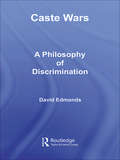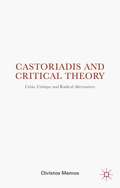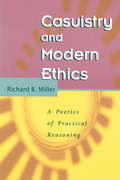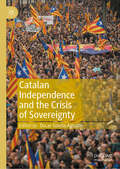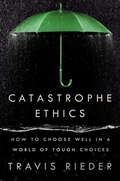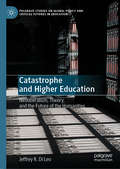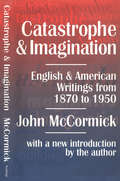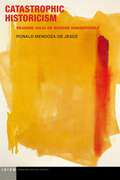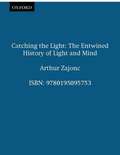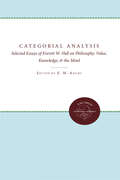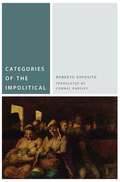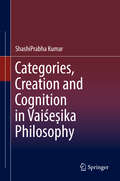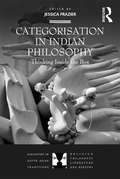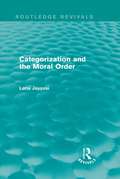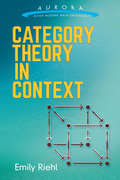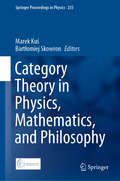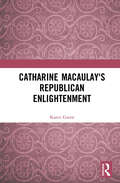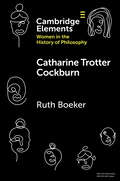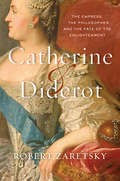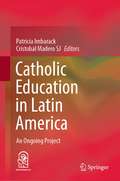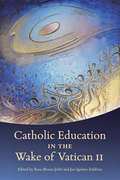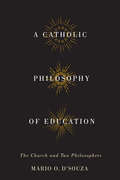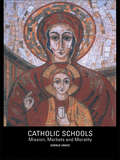- Table View
- List View
Caste Wars: A Philosophy of Discrimination (Routledge Studies in Ethics and Moral Theory #Vol. 7)
by David EdmondsThe central topic for this book is the ethics of treating individuals as though they are members of groups. The book raises many interesting questions, including: Why do we feel so much more strongly about discrimination on certain grounds – e.g. of race and sex - than discrimination on other grounds? Are we right to think that discrimination based on these characteristics is especially invidious? What should we think about ‘rational discrimination’ – ‘discrimination’ which is based on sound statistics? To take just one of dozens of examples from the book. Suppose a landlord turns away a prospective tenant, because this prospective tenant is of a particular ethnicity – arguing that statistics show that one in four of this group have been shown in the past to default on their rent. That seems clearly unfair to people of this ethnicity. But we are routinely being judged in this way – not just on the basis of our ethnicity, but assumptions are made about us and decisions taken about us based on our gender, religion, job, post-code, hobbies, blood-group, nationality, etc. Now suppose that another landlord turns away a convicted criminal, arguing that one in four of convicted criminals have been shown to be unreliable rent payers. Is our intuition the same as before? Should it be? This book is suitable for all students of philosophy, especially those with an interest in applied ethics.
Castoriadis and Critical Theory
by Christos MemosCombining philosophical and political analysis, this study offers a comprehensive reassessment of Castoriadis' contribution to critical theory in and through his critical confrontation with both the crisis of the traditional Left and the crisis of modern capitalist societies. The key concepts of 'crisis' and 'critique' are considered throughout the text and Castoriadis' ideas are situated in a critical debate with other radical thinkers, such as Lefort, Pannekoek, Arendt, Althusser, Axelos, Papaioannou and Marx. The study supplies an extensive analysis and explores the contemporary relevance of Castoriadis' views regarding the Russian Revolution of 1917, the Hungarian revolt of 1956 and the events of May 1968 in France. It argues for a re-radicalization of his thought in light of the current capitalist crisis and seeks to trace his radical alternative to crisis by critically examining and further elaborating his positions with respect to socialism, autonomy and revolution.
Casuistry and Modern Ethics: A Poetics of Practical Reasoning
by Richard B. MillerDid the Gulf War defend moral principle or Western oil interests? Is violent pornography an act of free speech or an act of violence against women? <p><p>In this book the author sheds new light on the potential of casuistry--case-based reasoning--for resolving these and other questions of conscience raised by the practical quandaries of modern life. Rejecting the packaging of moral experience within simple descriptions and inflexible principles, he argues instead for identifying and making sense of the ethically salient features of individual cases. Because this practical approach must cope with a diverse array of experiences, he draws on a wide variety of diagnostic tools from such fields as philosophy of science, legal reasoning, theology, literary theory, hermeneutics, and moral philosophy. <p><p>Opening new avenues for practical reasoning, the author's interdisciplinary work will challenge scholars who are interested in the intersections of ethics and political philosophy, cultural criticism, and debates about method in religion and morality.
Catalan Independence and the Crisis of Sovereignty
by Óscar García AgustínThis book explores the conflict between the Catalan project to become independent and the Spanish state’s opposition to any attempt of secessionism. The volume addresses some of the key political and academic issues of contemporary European societies: nationalism, separatism and sovereignty. The banned referendum in Catalonia in October 2017 unveiled the existence of multiple crises, from territorial to economic and political. Indeed, the Catalan issue is about the crisis of sovereignty: who holds legitimacy to make decisions, and who is in power legally and politically? The book is structured according to three themes: sovereignty and its people, where the realignment to independence, populism and the definition of the demos are discussed; collective identities and actions, to account for the shaping of ‘us’, the importance of collective memory and the cross-alliances forged during the referendum; and internationalization, focusing on Europeanisation, international media and comparative constitutional perspectives.
Catastrophe Ethics: How to Choose Well in a World of Tough Choices
by Travis RiederHow to live a morally decent life in the midst of today's constant, complex choices In a world of often confusing and terrifying global problems, how should we make choices in our everyday lives? Does anything on the individual level really make a difference? In Catastrophe Ethics, Travis Rieder tackles the moral philosophy puzzles that bedevil us. He explores vital ethical concepts from history and today and offers new ways to think about the &“right&” thing to do when the challenges we face are larger and more complex than ever before. Alongside a lively tour of traditional moral reasoning from thinkers like Plato, Mill, and Kant, Rieder posits new questions and exercises about the unique conundrums we now face, issues that can seem to transcend old-fashioned philosophical ideals. Should you drink water from a plastic bottle or not? Drive an electric car? When you learn about the horrors of factory farming, should you stop eating meat or other animal products? Do small commitments matter, or are we being manipulated into acting certain ways by corporations and media? These kinds of puzzles, Rieder explains, are everywhere now. And the tools most of us unthinkingly rely on to &“do the right thing&” are no longer enough. Principles like &“do no harm&” and &“respect others&” don&’t provide guidance in cases where our individual actions don&’t, by themselves, have any effect on others at all. We need new principles, with new justifications, in order to navigate this new world. In the face of consequential and complex crises, Rieder shares exactly how we can live a morally decent life. It&’s time to build our own catastrophe ethics.
Catastrophe and Higher Education: Neoliberalism, Theory, and the Future of the Humanities (Palgrave Studies on Global Policy and Critical Futures in Education)
by Jeffrey R. Di LeoThis book asks what it means to live in a higher educational world continuously tempered by catastrophe. Many of the resources for response and resistance to catastrophe have long been identified by thinkers ranging from Ralph Waldo Emerson and William James to H. G. Wells and Emanuel Haldeman-Julius. Di Leo posits that hope and resistance are possible if we are willing to resist a form of pessimism that already appears to be drawing us into its arms. Catastrophe and Higher Education argues that the future of the humanities is tied to the fate of theory as a form of resistance to neoliberalism in higher education. It also offers that the fate of the academy may very well be in the hands of humanities scholars who are tasked with either rejecting theory and philosophy in times of catastrophe—or embracing it.
Catastrophe and Imagination: English and American Writings from 1870 to 1950
by John McCormickSince World War II critics have been predicting the decline of the novel. This book argues that the novel is not dead. Looking at American and English fiction it claims that the novel can not only change the possibilities of art, but also contribute to awareness of life's possibilities.
Catastrophe and Redemption: The Political Thought of Giorgio Agamben (SUNY series in Contemporary Continental Philosophy)
by Jessica WhyteChallenging the prevalent account of Agamben as a pessimistic thinker, Catastrophe and Redemption proposes a reading of his political thought in which the redemptive element of his work is not a curious aside but instead is fundamental to his project. Jessica Whyte considers his critical account of contemporary politics—his argument that Western politics has been "biopolitics" since its inception, his critique of human rights, his argument that the state of exception is now the norm, and the paradigmatic significance he attributes to the concentration camp—and shows that it is in the midst of these catastrophes of the present that Agamben sees the possibility of a form of profane redemption. Whyte outlines the importance of potentiality in his attempt to formulate a new politics, examines his relation to Jewish and Christian strands of messianism, and interrogates the new forms of praxis that he situates within contemporary commodity culture, taking Agamben's thought as a call for the creation of new political forms.
Catastrophic Historicism: Reading Julia de Burgos Dangerously (Idiom: Inventing Writing Theory)
by Ronald Mendoza-de JesúsCatastrophic Historicism unsettles the historicist constitution of Julia de Burgos (1914–53), Puerto Rico’s most iconic writer—a critical task that necessitates redefining the concept of historicism. Through readings of Aristotle, Walter Benjamin, Jacques Derrida, Werner Hamacher, and Frank Ankersmit, Mendoza-de Jesús shows that historicism grounds historical objectivity in the historian’s capacity to compose totalizing narratives that domesticate the contingency of the past. While critiques of historicism as a realism leave untouched the sovereignty of the historian, the book insists that reading the text of history requires an attunement to danger—a modality that interrupts historicism by infusing the past with a contingency that evades total appropriation.After desedimenting the monumental tradition that has reduced de Burgos to a totemic figure, Catastrophic Historicism reads the poet’s first collection, Poema en 20 surcos (1938). Mendoza-de Jesús argues that the historicity of Poema crystallizes in the lyrical speaker’s self-institution as an embodied ipseity, which requires producing racialized/gendered allegorical figures—the bearers of an abject flesh—that lack any ontological resistance to modern alienation. Rather than treating de Burgos’s poetics of selfhood as the ideal image of Puerto Rican sovereignty, Mendoza-de Jesús endangers this idealization by drawing attention to the abjection that sustains our attachments to ipseity as the form of a truly sovereign life. In this way, Catastrophic Historicism not only resets the terms of ongoing critiques of historicism in the humanities—it also intervenes in Puerto Rican historicity for the sake of its transformation.
Catching THE Light: The Entwined History of Light and Mind
by Arthur ZajoncIn 1910, the surgeons Moreau and LePrince wrote about their successful operation on an eight-year-old boy who had been blind since birth because of cataracts. When the boy's eyes were healed they removed the bandages and, waving a hand in front of the child's physically perfect eyes, asked him what he saw. "I don't know," was his only reply. What he saw was only a varying brightness in front of him. However, when allowed to touch the hand as it began to move, he cried out in a voice of triumph, "It's moving!" He could feel it move, but he still needed laboriously to learn to see it move. Light and eyes were not enough to grant him sight. How, then, do we see? What's the difference between seeing and perception? What is light? From ancient times to the present, from philosophers to quantum physicists, nothing has so perplexed, so fascinated, so captivated the mind as the elusive definition of light. In Catching the Light, Arthur Zajonc takes us on an epic journey into history, tracing how humans have endeavored to understand the phenomenon of light. Blending mythology, religion, science, literature, and painting, Zajonc reveals in poetic detail the human struggle to identify the vital connection between the outer light of nature and the inner light of the human spirit. He explains the curiousness of the Greeks' blue and green "color blindness": Odysseus gazing longingly at the "wine-dark sea"; the use of chloros (green) as the color of honey in Homer's Odessey; and Euripides' use of the color green to describe the hue of tears and blood. He demonstrates the complexity of perception through the work of Paul Cézanne--the artist standing on the bank of a river, painting the same scene over and over again, the motifs multiplying before his eyes. And Zajonc goes on to show how our quest for an understanding of light, as well as the conclusions we draw, reveals as much about the nature of our own psyche as it does about the nature of light itself. For the ancient Egyptians the nature of light was clear--it simply was the gaze of God. In the hands of the ancient Greeks, light had become the luminous inner fire whose ethereal effluence brought sight. In our contemporary world of modern quantum physics, science plays the greatest part in our theories of light's origin--from scientific perspectives such as Sir Isaac Newton's "corpuscular theory of light" and Michael Faraday's "lines of force" to such revolutionary ideas as Max Planck's "discrete motion of a pendulum" (the basis of quantum mechanics), Albert Einstein's "particles of light" and "theory of relativity," and Niels Bohr's "quantum jumps. " Yet the metaphysical aspects of the scientific search, Zajonc shows, still loom large. For the physicist Richard Feynman, a quantum particle travels all paths, eventually distilling to one path whose action is least--the most beautiful path of all. Whatever light is, here is where we will find it. With rare clarity and unmatched lyricism, Zajonc illuminates the profound implications of the relationships between the multifaceted strands of human experience and scientific endeavor. A fascinating search into our deepest scientific mystery, Catching the Light is a brilliant synthesis that will both entertain and inform.
Categorial Analysis: Selected Essays of Everett W. Hall on Philosophy, Value, Knowledge, and the Mind
by E. M. AdamsThe essays in this volume have been selected for their contribution to Everett W. Hall's mature philosophical position, which was grounded in careful linguistic analysis and directed toward philosophically clarifying the major areas of culture. He emerges as skillful, meticulous, and patient in his exploration of language as a means of interpreting the categorial structure of the world.Originally published in 1964.A UNC Press Enduring Edition -- UNC Press Enduring Editions use the latest in digital technology to make available again books from our distinguished backlist that were previously out of print. These editions are published unaltered from the original, and are presented in affordable paperback formats, bringing readers both historical and cultural value.
Categories of the Impolitical
by Roberto Esposito Connal ParsleyThe notion of the "impolitical" developed in this volume draws its meaning from the exhaustion of modernity's political categories, which have become incapable of giving voice to any genuinely radical perspective. The impolitical is not the opposite of the political but rather its outer limit: the border from which we might glimpse a trajectory away from all forms of political theology and the depoliticizing tendencies of a completed modernity. The book's reconstruction of the impolitical lineage--which is anything but uniform--begins with the extreme conclusions reached by Carl Schmitt and Romano Guardini in their reflections on the political and then moves through a series of encounters between several great twentieth-century texts: from Hannah Arendt's On Revolution to Hermann Broch's The Death of Virgil, to Elias Canetti's Crowds and Power; from Simone Weil's The Need for Roots to Georges Bataille's Sovereignty to Ernst Junger's An der Zeitmauer. The trail forged by this analysis offers a defiant counterpoint to the modern political lexicon, but at the same time a contribution to our understanding of its categories.
Categories, Creation and Cognition in Vaiśeṣika Philosophy
by ShashiPrabha KumarThe proposed book presents an overview of select theories in the classical Vaiśeṣika system of Indian philosophy, such as the concept of categories, creation and existence, atomic theory, consciousness and cognition. It also expounds in detail the concept of dharma, the idea of the highest good and expert testimony as a valid means of knowing in Vaiśeṣika thought. Some of the major themes discussed are the religious inclination of Vaiśeṣika thought towards Pasupata Saivism, the affiliation of the Vaiśeṣika System to the basic foundations of Indian philosophical thought, namely Veda and Yoga, and their insights into science, hermeneutics and metaphysics. In addition, this book includes recent Sanskrit commentaries on key Vaiśeṣika texts and provides a glimpse of Vaiśeṣika studies across the world. Overall, this book enunciates the Vaiśeṣika view from original sources and is an important work for Vaiśeṣika studies in current times for serious students as well as researchers.
Categorisation in Indian Philosophy: Thinking Inside the Box (Dialogues in South Asian Traditions: Religion, Philosophy, Literature and History)
by Jessica FrazierIt is by fitting the world into neatly defined boxes that Buddhist, Hindu, and Jain philosophers were able to gain unparalleled insights into the nature of reality, God, language and thought itself. Such categories aimed to encompass the universe, the mind and the divine within an all-encompassing system, from linguistics to epistemology, logic and metaphysics, theology and the nature of reality. Shedding light on the way in which Indian philosophical traditions crafted an elaborate picture of the world, this book brings Indian thinkers into dialogue with modern philosophy and global concerns. For those interested in philosophical traditions in general, this book will establish a foundation for further comparative perspectives on philosophy. For those concerned with the understanding of Indic culture, it will provide a platform for the continued renaissance of research into India's rich philosophical traditions.
Categorization and the Moral Order (Routledge Revivals)
by Lena JayyusiFirst published in 1984, this is a study of categorization practices: how people categorize each other and their actions; how they describe, infer, and judge. The book presents a sociological analysis and description of practical activities and makes a cogent contribution to the study of how the moral order actually works in practical communicative contexts. Among the issues dealt with are: collectivity categorizations, the organization of lists and descriptions, moral attribution and inferences, and the relationship between standards of morality and standards of rationality.
Category Theory in Context (Aurora: Dover Modern Math Originals)
by Emily RiehlCategory theory has provided the foundations for many of the twentieth century's greatest advances in pure mathematics. This concise, original text for a one-semester course on the subject is derived from courses that author Emily Riehl taught at Harvard and Johns Hopkins Universities. The treatment introduces the essential concepts of category theory: categories, functors, natural transformations, the Yoneda lemma, limits and colimits, adjunctions, monads, and other topics. Suitable for advanced undergraduates and graduate students in mathematics, the text provides tools for understanding and attacking difficult problems in algebra, number theory, algebraic geometry, and algebraic topology. Drawing upon a broad range of mathematical examples from the categorical perspective, the author illustrates how the concepts and constructions of category theory arise from and illuminate more basic mathematical ideas. Prerequisites are limited to familiarity with some basic set theory and logic.
Category Theory in Physics, Mathematics, and Philosophy (Springer Proceedings in Physics #235)
by Marek Kuś Bartłomiej SkowronThe contributions gathered here demonstrate how categorical ontology can provide a basis for linking three important basic sciences: mathematics, physics, and philosophy. Category theory is a new formal ontology that shifts the main focus from objects to processes.The book approaches formal ontology in the original sense put forward by the philosopher Edmund Husserl, namely as a science that deals with entities that can be exemplified in all spheres and domains of reality. It is a dynamic, processual, and non-substantial ontology in which all entities can be treated as transformations, and in which objects are merely the sources and aims of these transformations.Thus, in a rather surprising way, when employed as a formal ontology, category theory can unite seemingly disparate disciplines in contemporary science and the humanities, such as physics, mathematics and philosophy, but also computer and complex systems science.
Catharine Macaulay's Republican Enlightenment
by Karen GreenThe ‘celebrated’ Catharine Macaulay was both lauded and execrated during the eighteenth century for her republican politics and her unconventional, second marriage. This comprehensive biography in the 'life and letters' tradition situates her works in their political and social contexts and offers an unprecedented, detailed account of the content and influence of her writing, the arguments she developed in her eight-volume history of England and her other political, ethical, and educational works. Her disagreements with conservative opponents, David Hume, Edmund Burke, and Samuel Johnson are developed in detail, as is her influence on more progressive admirers such as Thomas Jefferson, Jacques-Pierre Brissot, Mercy Otis Warren, and Mary Wollstonecraft. Macaulay emerges as a coherent and influential political voice, whose attitudes and aspirations were characteristic of those enlightenment republicans who grounded their progressive politics in rational religion. She looked back to the seventeenth-century levellers and parliamentarians as important precursors who had advocated the liberty and political rights she aspired to see implemented in Great Britain, America, and France. Her defence of republican liberty and the equal rights of men offers an important corrective to some contemporary accounts of the character and origins of democratic republicanism during this crucial period.
Catharine Trotter Cockburn (Elements on Women in the History of Philosophy)
by Ruth BoekerThis Element offers the first detailed study of Catharine Trotter Cockburn's philosophy and covers her contributions to philosophical debates in epistemology, metaphysics, moral philosophy, and philosophy of religion. It not only examines Cockburn's view that sensation and reflection are the sources of knowledge, but also how she draws attention to the limitations of human understanding and how she approaches metaphysical debates through this lens. In the area of moral philosophy, this Element argues that it is helpful to take seriously Cockburn's distinction between questions concerning the metaphysical foundation of morality and questions concerning the practice of morality. Moreover, this Element examines Cockburn's religious views and considers her understanding of the relation between morality and religion and her religious views concerning the resurrection and the afterlife.
Catherine & Diderot: The Empress, the Philosopher, and the Fate of the Enlightenment
by Robert ZaretskyIn a dual biography crafted around the famous encounter between the French philosopher who wrote about power and the Russian empress who wielded it with great aplomb, Robert Zaretsky invites us to reflect on the fraught relationship between politics and philosophy, and between a man of thought and a woman of action.
Catholic Education in Latin America: An Ongoing Project
by Patricia Imbarack Cristobal Madero SjThis book aims to be a reference for understanding an educational system throughout Latin America aligned with the Catholic Church. In both public and private sectors, whether it’s in the secular or the religious sector, considering Catholic Education brings up a question regarding the relevance of religion in the public sector, where education is presented as another alternative of education. This volume allows the reader to take a closer look into the recent challenges of Catholic Education in Latin America, such as quality and excellence, its anthropological dimension, as well as the ongoing dialogue between faith and culture. These essential elements are reflected upon, developing an educational process that responds to the current needs. Deep reflection is made in a contemporary and regional context throughout the eleven chapters of this book, all written by Latin American authors. Translation from the Spanish language edition: EDUCACIÓN CATÓLICA EN LATINOAMÉRICA. Un proyecto en marcha by Patricia Imbarack and Cristóbal Madero © Ediciones Universidad Católica de Chile, 2019. Original Publication ISBN 978-956-14-2459-3. All rights reserved
Catholic Education in the Wake of Vatican II
by Rosa Bruno-Jofre Jon Igelmo ZaldivarThe Second Vatican Council (Vatican II), called by Pope John XXIII in 1959, produced sixteen documents that outlined the Church’s attempts to meet increasing calls for modernization in the wake of social and cultural changes that were taking place in the twentieth century. Catholic Education in the Wake of Vatican II is the first work dedicated to the effects of the Second Vatican Council on catholic education in various national and cultural contexts. These original pieces, grounded in archival research, explore the social, political, and economic repercussions of Catholic educational changes in Canada, Europe, and South America. The volume provides insightful analysis of many issues including the tensions between Catholicism and Indigenous education in Canada, the secularization of curriculum in the Catholic classroom, Church-State relations and more. The contributors reveal the tensions between doctrinal faith and socio-economic structures of privilege found within the Church and introduces the reader to complex political interactions within the Church itself in the midst of a rapid era of secularization.
Catholic Philosophy of Education: The Church and Two Philosophers
by Mario O. D'SouzaToday’s pluralist and multicultural society raises questions about how to teach religiously and ethnically diverse students in Catholic schools. A Catholic Philosophy of Education addresses these challenges by examining the documents from the Roman Congregation for Catholic Education alongside the writings of Jacques Maritain and Bernard Lonergan. Mario D’Souza proposes a contemporary formulation for a Catholic philosophy of education in which the ideals of Catholicism form the basis for the mission of the Catholic school. Drawing on the Church’s educational documents, and informed by Maritain and Lonergan, D’Souza explains how the unifying anthropology of Catholic education enables Catholic schools to serve amidst diversity by avoiding the extremes of religious exclusivism and fundamentalism, on the one hand, and relativism and individualism, on the other. He explores the aims of Catholic schools in relation to students, teachers, and society, and the relationship between goodness, discipline, and knowledge. He argues that students must be educated for personal and communal freedom and authenticity, and to strive for the common good, suggesting how a Catholic philosophy of education can provide the framework for such personal and communal transformation. Essential reading for new and experienced Catholic educators, A Catholic Philosophy of Education demonstrates that Maritain and Lonergan have much to offer in service of an education that is liberating, instructive, illuminating, and integrative.
Catholic Philosophy of Education: The Church and Two Philosophers
by Mario O. D'SouzaToday’s pluralist and multicultural society raises questions about how to teach religiously and ethnically diverse students in Catholic schools. A Catholic Philosophy of Education addresses these challenges by examining the documents from the Roman Congregation for Catholic Education alongside the writings of Jacques Maritain and Bernard Lonergan. Mario D’Souza proposes a contemporary formulation for a Catholic philosophy of education in which the ideals of Catholicism form the basis for the mission of the Catholic school. Drawing on the Church’s educational documents, and informed by Maritain and Lonergan, D’Souza explains how the unifying anthropology of Catholic education enables Catholic schools to serve amidst diversity by avoiding the extremes of religious exclusivism and fundamentalism, on the one hand, and relativism and individualism, on the other. He explores the aims of Catholic schools in relation to students, teachers, and society, and the relationship between goodness, discipline, and knowledge. He argues that students must be educated for personal and communal freedom and authenticity, and to strive for the common good, suggesting how a Catholic philosophy of education can provide the framework for such personal and communal transformation. Essential reading for new and experienced Catholic educators, A Catholic Philosophy of Education demonstrates that Maritain and Lonergan have much to offer in service of an education that is liberating, instructive, illuminating, and integrative.
Catholic Schools: Mission, Markets, and Morality
by Gerald GraceIn this ground-breaking book, Gerald Grace addresses the dilemmas facing Catholic education in an increasingly secular and consumer-driven culture. The book combines an original theoretical framework with research drawn from interviews with sixty Catholic secondary head teachers from deprived urban areas. Issues discussed include: *Catholic meanings of academic success*tensions between market values and Catholic values*threats to the mission integrity of Catholic schools*the spiritual, moral and social justice commitments of contemporary Catholic schools This book will be equally useful to leaders of Catholic and other schools and to all those interested in values and leadership in schooling.
